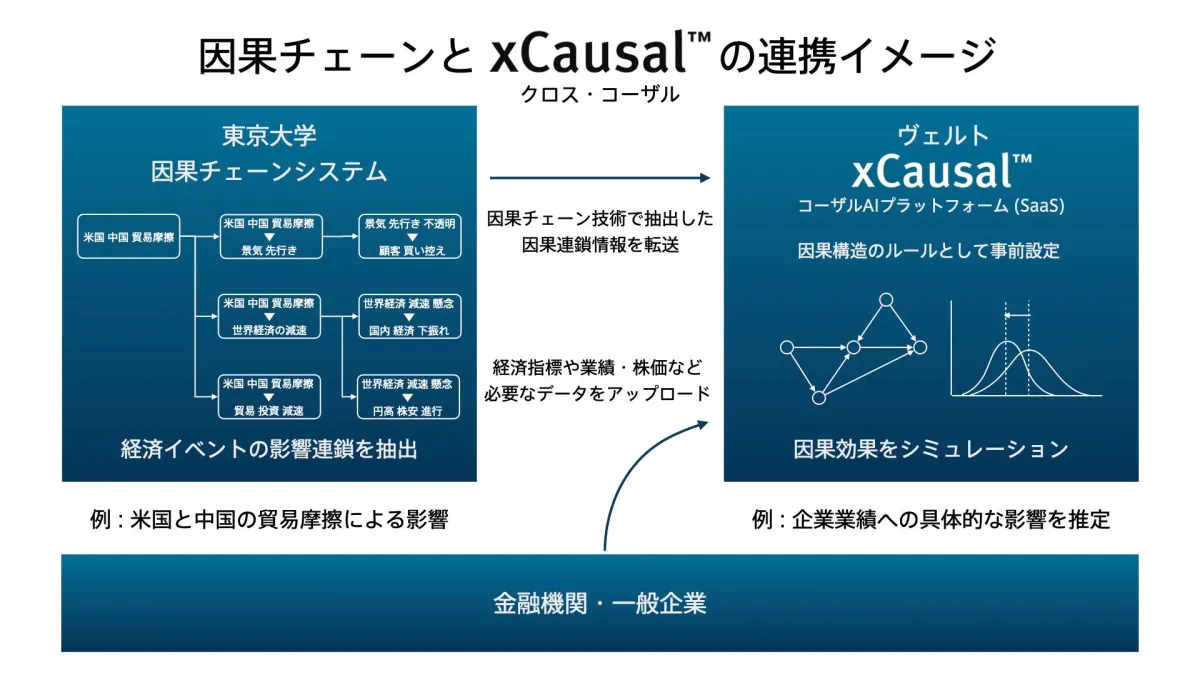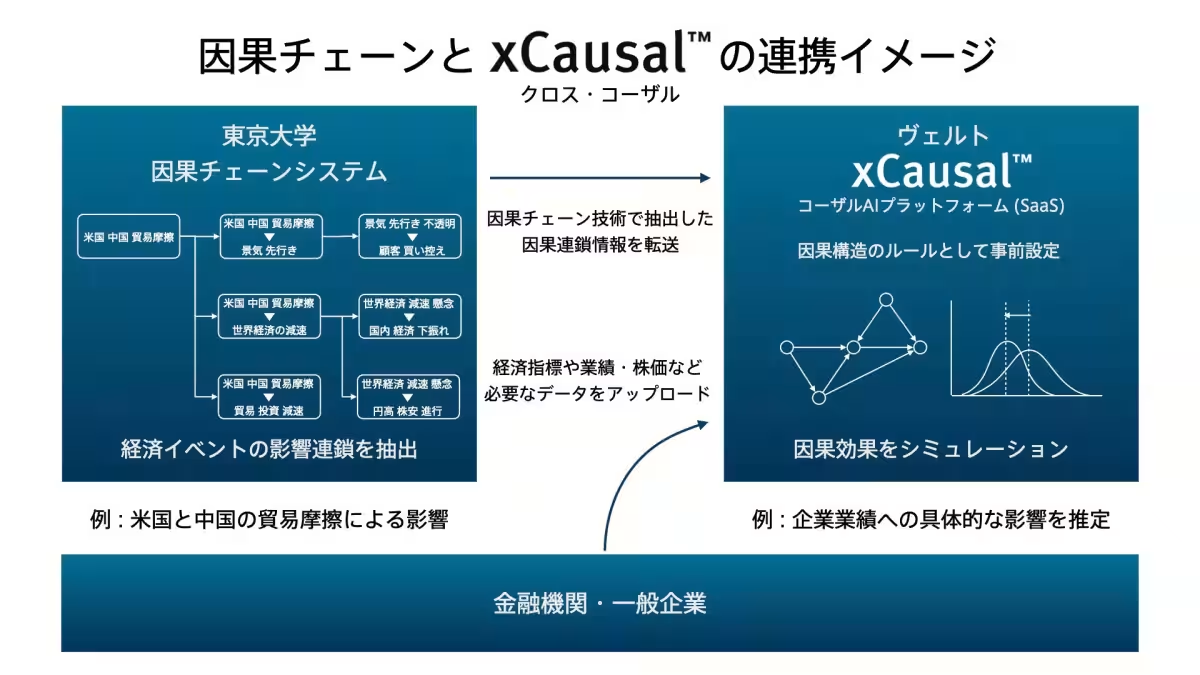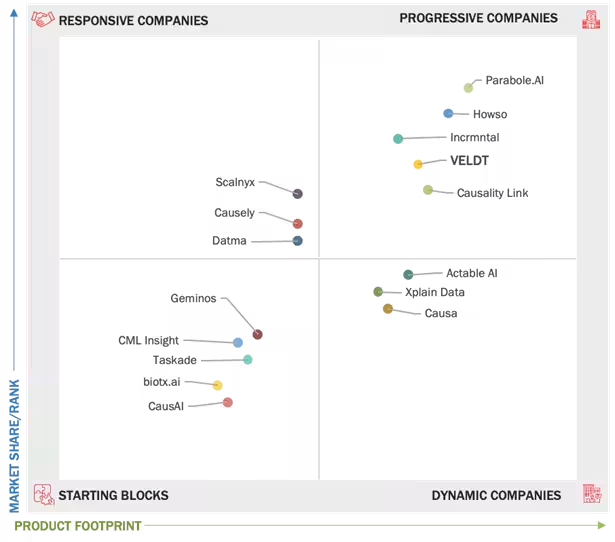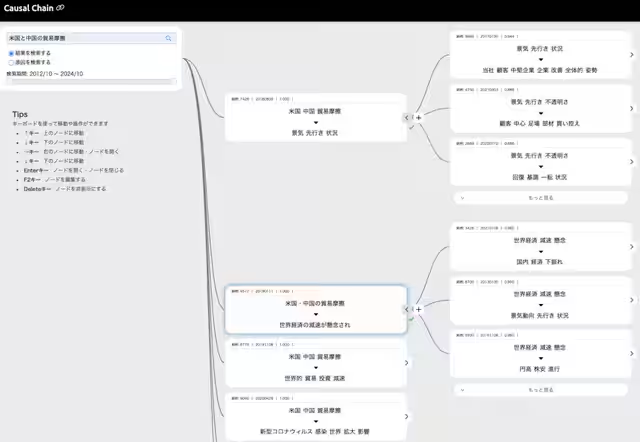

Velt Collaborates with the University of Tokyo to Enhance xCausal™ with Causal Chain Technology
In an exciting development for the world of causal inference AI, Velt Co., Ltd. has announced a strategic partnership with the University of Tokyo’s Izumi Laboratory. This collaboration aims to deepen the understanding of causal relationships in the finance and economics sectors using the causal AI platform, xCausal™.
Velt’s xCausal™ is designed to swiftly estimate causal relationships from data. By adopting the causal chain technology developed by the Izumi Laboratory, the platform can now extract and visualize complex causal chains from textual information, such as financial statements and reports.
With the new integration, businesses and organizations utilizing causal chain techniques will not only be able to visualize the structures of causal relationships but will also benefit from simulating specific causal effects right on the xCausal™ platform. For instance, organizations can estimate how particular economic events might impact their performance, potentially aiding in more informed decision-making processes.
Currently, many companies rely on correlation-based hypotheses to identify causes and resolve issues, which often leads to confusion with spurious correlations—situations where relationships appear significant but are not causally linked. This process can consume considerable time and may leave unresolved cases. Velt’s xCausal™, grounded in the theory of structural causal models, provides a sophisticated solution by accurately calculating causal effects. This user-friendly SaaS platform eliminates the need for extensive coding skills, making it accessible for business users.
The causal chain technology created by the Izumi Laboratory is particularly noteworthy, as it enables the extraction of causal relationships from economic reports and financial briefs. Users have the flexibility to specify initial texts for establishing cause and effect, allowing for user-selected causal chains. The xCausal™ platform enhances this by offering the ability to set rules for known causal relationships when creating causal graphs.
This collaboration marks a significant step forward, as the information established through the causal chain is now available via external APIs, opening up new avenues for companies in the financial sector. Businesses can streamline and refine their decision-making processes using data-driven approaches, supported by Velt’s professional services that offer custom implementations to meet specific needs.
Professor Kiyoshi Izumi from the University of Tokyo’s Graduate School of Engineering commented, “In recent years, causal AI has gained considerable attention across various business practices, especially in finance. The integration of statistical causal inference with natural language processing for narrative causation highlights the applicability and usefulness of these technologies. This collaborative technology is anticipated to enhance the practical value of causal AI significantly.”
Velt stands at the forefront of causal AI as a leading company and has been recognized as a ‘Progressive’ startup in the latest MarketandMarkets report on the global causal AI market for 2024. The report praises Velt for several key attributes, including their code-free platform that enhances business users’ capabilities, their fully integrated causal intelligence system, and their focus on delivering enterprise-grade services in a secure and compliant manner.
The company continues to provide comprehensive support through professional services, facilitating workshops for variable selection and data consulting, along with the outsourcing of causal model construction. By innovating how technology is engaged with, Velt seeks to create a positive spiral for society and the environment through its contributions in data analytics and causal relationships.
Founded in August 2012, Velt is headquartered in Shibuya, Tokyo. Led by CEO Hitoshi Nonogami, Velt’s mission is to develop analytical technologies that address social challenges while fostering goodwill innovation. With a commitment to transparency and reliability, Velt aims to combine the strengths of both causal and correlation-based AI technologies for a brighter, more informed future.



Velt’s xCausal™ is designed to swiftly estimate causal relationships from data. By adopting the causal chain technology developed by the Izumi Laboratory, the platform can now extract and visualize complex causal chains from textual information, such as financial statements and reports.
With the new integration, businesses and organizations utilizing causal chain techniques will not only be able to visualize the structures of causal relationships but will also benefit from simulating specific causal effects right on the xCausal™ platform. For instance, organizations can estimate how particular economic events might impact their performance, potentially aiding in more informed decision-making processes.
Currently, many companies rely on correlation-based hypotheses to identify causes and resolve issues, which often leads to confusion with spurious correlations—situations where relationships appear significant but are not causally linked. This process can consume considerable time and may leave unresolved cases. Velt’s xCausal™, grounded in the theory of structural causal models, provides a sophisticated solution by accurately calculating causal effects. This user-friendly SaaS platform eliminates the need for extensive coding skills, making it accessible for business users.
The causal chain technology created by the Izumi Laboratory is particularly noteworthy, as it enables the extraction of causal relationships from economic reports and financial briefs. Users have the flexibility to specify initial texts for establishing cause and effect, allowing for user-selected causal chains. The xCausal™ platform enhances this by offering the ability to set rules for known causal relationships when creating causal graphs.
This collaboration marks a significant step forward, as the information established through the causal chain is now available via external APIs, opening up new avenues for companies in the financial sector. Businesses can streamline and refine their decision-making processes using data-driven approaches, supported by Velt’s professional services that offer custom implementations to meet specific needs.
Professor Kiyoshi Izumi from the University of Tokyo’s Graduate School of Engineering commented, “In recent years, causal AI has gained considerable attention across various business practices, especially in finance. The integration of statistical causal inference with natural language processing for narrative causation highlights the applicability and usefulness of these technologies. This collaborative technology is anticipated to enhance the practical value of causal AI significantly.”
Velt stands at the forefront of causal AI as a leading company and has been recognized as a ‘Progressive’ startup in the latest MarketandMarkets report on the global causal AI market for 2024. The report praises Velt for several key attributes, including their code-free platform that enhances business users’ capabilities, their fully integrated causal intelligence system, and their focus on delivering enterprise-grade services in a secure and compliant manner.
The company continues to provide comprehensive support through professional services, facilitating workshops for variable selection and data consulting, along with the outsourcing of causal model construction. By innovating how technology is engaged with, Velt seeks to create a positive spiral for society and the environment through its contributions in data analytics and causal relationships.
Founded in August 2012, Velt is headquartered in Shibuya, Tokyo. Led by CEO Hitoshi Nonogami, Velt’s mission is to develop analytical technologies that address social challenges while fostering goodwill innovation. With a commitment to transparency and reliability, Velt aims to combine the strengths of both causal and correlation-based AI technologies for a brighter, more informed future.



Topics Consumer Technology)










【About Using Articles】
You can freely use the title and article content by linking to the page where the article is posted.
※ Images cannot be used.
【About Links】
Links are free to use.